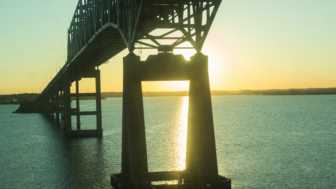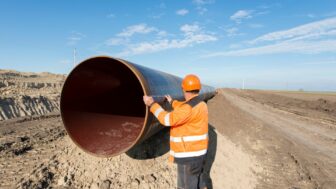On the Heels of Massive Fracked-Gas Pipeline Shutdowns Nationally, Hogan Administration Considering Approval for a New Pipeline down the Eastern Shore of Maryland
SALISBURY, MD — Today, environmental organizations announced that more than 1,500 public comments were submitted to the Maryland Department of Environment opposing the Del-Mar Pipeline project. As the department considers its recommendation to the Board of Public Works on the project’s application for a Wetlands License, the comments explain how this pipeline would threaten the Eastern Shore’s wetlands ecosystems and contribute to climate change.
Anthony Field, Maryland Grassroots Coordinator for the Chesapeake Climate Action Network, stated: “This proposed fracked-gas pipeline is a bad bet for Maryland. At a time when the climate crisis is imminent and the fracked-gas industry is failing, expanding fracked-gas expansion is financially and morally irresponsible. The state should invest in a truly clean and safe future for Marylanders, instead of pumping millions into near obsolete infrastructure that fuels the climate crisis while threatening local ecosystems.”
The Eastern Shore Natural Gas Company (ESNG) — a subsidiary of Chesapeake Utilities — wants to build 19+ miles of new pipeline to carry fracked gas from Delaware through Maryland, to connect with another fracked-gas pipeline proposed by Chesapeake Utilities that would bring fracked gas to the University of Maryland Eastern Shore (UMES) and the Eastern Correctional Institution (ECI). These two proposed pipelines would threaten the region’s ecosystems and drinking water supplies, and could cause irreparable damage to the land and climate.
These comments come just after two massive national fracked-gas pipelines were cancelled or ordered to shut down. Companies behind the proposed Atlantic Coast Pipeline cancelled the project due to ballooning costs and legal uncertainties. And the Dakota Access pipeline was ordered to shut down for an environmental review. Meanwhile, in late June, the fracking giant Chesapeake Energy filed for bankruptcy. These setbacks for the industry demonstrate that fracking is a risky investment, for the climate, the environment, and the economy.
Susan Olsen, Chair of the Sierra Club’s Lower Eastern Shore Group, stated: “We submitted these comments today to tell our leaders what we’ve been telling them for years: Marylanders don’t want fracking, we don’t want fracked gas, and we don’t want dirty, dangerous fracked gas pipelines. It makes no sense to build unnecessary fracked gas pipelines when we could be investing in the clean, renewable energy sources that are affordable and abundant right now. We banned fracking in 2017, we threw out the Potomac Pipeline in 2019, and we should reject the Eastern Shore Pipeline now.”
The pipeline is already under construction in Delaware to carry gas from that state into Maryland. The seven miles of pipeline proposed for Maryland would supply concentrated animal feeding operations, businesses, and residential areas. The two “anchor” customers for gas delivery are the Eastern Correctional Institute (ECI) and the University of Maryland Eastern Shore (UMES) in Somerset County. If built, the Del-Mar pipeline would trigger the second pipeline proposed by Chesapeake Utilities connecting the prison to the university. The installation of the Del-Mar pipeline will impact 1,239 square feet of streams and more than 30,000 square feet of wetlands and wetland buffers. It is anticipated to come online in late 2021.
These two pipelines are part of the Hogan Administration’s plans to spend $103 million massively increasing fracked-gas pipelines and infrastructure in the state. This includes $30.3 million administered by the Maryland Energy Administration’s (MEA) new Maryland Gas Expansion Fund “for the expansion of natural gas infrastructure.” The remaining $70 million is recoverable from MD ratepayers. Read more about it here.
Contact: Denise Robbins, denise@chesapeakeclimate.org, 240-630-1889
###
The Chesapeake Climate Action Network is the first grassroots organization dedicated exclusively to raising awareness about the impacts and solutions associated with global warming in the Chesapeake Bay region. For 17 years, CCAN has been at the center of the fight for clean energy and wise climate policy in Maryland, Virginia, and Washington, D.C.





